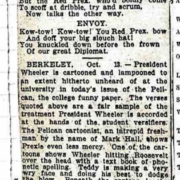The Diplomat
The Diplomat.
229.1
I.
The Big Chief of the Cardinal,
In speeches down the Bay,
Proclaimed his views about the game
That they were going to play.
“No namby, pamby game for us!
No Anglomania here!
We want a sport that’s rough and tough,
Of good American manly stuff!”
My, how his pupils cheer!
II.
He met his brother president
And secretly conferred;
The Red Prex. came for the good old game-
Until B. I. demurred-
The detalls never will be known
Of what he had to say-
But the Red Prex. who’d boldly come
“To scoff at dribble, try and scrum,
Now talks the other way.
ENVOY.
Kow-tow! Kow-tow! You Red Prex. bow
And doff your big slouch hat!
You knuckled down before the frown
Of our great Diplomat.
Wheeler is cartooned and lampooned to
an extent hitherto unheard of at the
university in today’s issue of the Pell-
can, the college funny paper.
The verses quoted above are a fair sample of the treatment
President Wheeler is accorded at the hands of the student versifiers.
The Pelican cartoonist, an intrepid fresh- man by the name of Mark Hall, shows
Prexie even less mercy.
One of the car- toons shows
Wheeler hitting Roosevelt over the head with a text book of-pho- netla spelling.
Teddy is making a very wry face and doing his best to dodge the blow.
Beneath the cartoon is the legend, “Nothing Doing.
Teddy.” Again the presideht is caricatured as a school teacher asking the question,
“Who is the greatest man in the world today?
Some of the most prominent members of the faculty are his pupils.
Each is crying “Prexle Wheeler,” but with a mental reservation.
This reser- vation is indicated on a card which each of the pupils holds in his hand at his alde.
Professor Henry Morse Stephens has tied to his whiskers the legend:
Next to Henry.” “Ge Other tags read: to Soule “Gayley First,” Next to Miller” “After Plehn.” and “Not in the Same Class with Howison.
Nor is President Wheeler the only member of the faculty who is attention of the given the student versifiers and cartoonists.
Among others, Professor Henry Morse Stephens receives a liberal amount of space.
Those who are acquainted with the habits of the English sage and have read Kipling, will appreciate the follow- ing:



Leave a Reply
Want to join the discussion?Feel free to contribute!